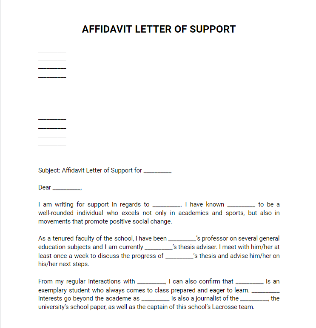- Eviction Notice Forms
- Power of Attorney Forms Forms
- Bill of Sale (Purchase Agreement) Forms
- Lease Agreement Forms
- Rental Application Forms
- Living Will Forms Forms
- Recommendation Letters Forms
- Resignation Letters Forms
- Release of Liability Agreement Forms
- Promissory Note Forms
- LLC Operating Agreement Forms
- Deed of Sale Forms
- Consent Form Forms
- Support Affidavit Forms
- Paternity Affidavit Forms
- Marital Affidavit Forms
- Financial Affidavit Forms
- Residential Affidavit Forms
- Affidavit of Identity Forms
- Affidavit of Title Forms
- Employment Affidavit Forms
- Affidavit of Loss Forms
- Gift Affidavit Forms
- Small Estate Affidavit Forms
- Service Affidavit Forms
- Heirship Affidavit Forms
- Survivorship Affidavit Forms
- Desistance Affidavit Forms
- Discrepancy Affidavit Forms
- Guardianship Affidavit Forms
- Undertaking Affidavit Forms
- General Affidavit Forms
- Affidavit of Death Forms
Support Affidavit
Traveling or migrating to another country can be heavy on the pocket, so it’s no wonder why there are policies in place to ensure that an individual has the financial capacity to meet the requirements. Oftentimes, individuals seek financial sponsorship from a spouse or relative, which is made known in the affidavit, to help secure visa issuance. It’s one of the many reasons why Support Affidavits play an essential role not only in financial-related matters, but also in academic and personal affairs. Read More

Support Affidavit
What Is a Support Affidavit?
While generally characterized as a legal paper that guarantees the signee’s full financial responsibility to sponsor a spouse or relative, a Support Affidavit (otherwise known as an Affidavit of Support) can also serve other purposes. It’s a supplementary document widely used in various settings—be it for a personal or professional benefit. Apart from travel-related reasons, a Support Affidavit may also be used to vouch for an individual. When you apply for a job or scholarship, or to become a beneficiary of a charity program, an Affidavit Letter of Support can help verify your identity and petition your eligibility for the said position. You can also use the affidavit to prove and declare that you are granting someone else the authority to carry out a specific action, as expressed explicitly in an Affidavit of Consent and Support.
How Do You Write a Support Affidavit?
How you draft your Support Affidavit can greatly influence the outcome of your application or petition. Below is a five-step process you can follow to create a well-written Support Affidavit.
Title the Document
Because there are different types of affidavits each written for a specific purpose, it’s always a good idea to title your document accordingly. Doing so should provide the reader with a general idea of what the affidavit covers, which then streamlines the filing and processing system of an organization.
Provide the Identification Details
As the Affiant, or the person providing the Support Affidavit, a statement of identity is essential for authentication reasons. You’ll need to include your full name, residential address, date of birth, and any other information relevant to the situation. Be sure that you have the necessary documentation to verify your identity, such as a driver’s license or passport, in case you’ll need to prove that you’re the person signing the affidavit.
Explain Your Relationship with the Beneficiary
Whether you’re the parent, sibling, professor, coach, or friend of the beneficiary involved in the affidavit, an account explaining your relationship with the individual is not something to miss. Blood relatives of the individual need not expound details of their relationship any further, but as the beneficiary’s spouse, friend, or mentor, additional information about your relationship may be useful for verification. Some of the points to clarify include how you know each other, for how long, and the frequency of your contact with the individual. The details to best emphasize in this section would depend on the objective of your affidavit, as some things are worth mentioning while others may be irrelevant to your purpose.
Include a Statement of Affirmation
Dedicate a section of the affidavit to declare your responsibility to, for example, provide financial support to the person you are sponsoring. Keep it as clear and concise as possible. This statement should let the reader know that you agree to fully commit to the responsibility stipulated in the document.
Date and Sign the Affidavit
The final step in completing your affidavit is to sign it in the presence of a witness and/or notary. Although notarization may not be necessary for affidavits made for a friend or family member, particularly those in letter form, it’s still strongly recommended to include a statement swearing the affidavit’s validity. This statement should indicate that you acknowledge the contents of the document and claim that such contents are true and correct to the best of your knowledge.
FAQs
Who qualifies for an affidavit of support?
Affiants in financial-related affidavits need to meet different requirements to become a petitioner or sponsor, depending on the qualifications set by state laws or immigrant or nonimmigrant visa policies. Common guidelines require the affiant to be of legal age and with an annual income that is at least a specified amount. Thus, you want to make sure you’ve done your research before agreeing to create a Support Affidavit for whatever purpose.
How do you withdraw from an affidavit of support?
There are many reasons why someone would choose to pull out their affidavit of support, one of which is to protect their financial assets following a conflict between them (the affiant) and the beneficiary. Fortunately, you can legally revoke your support by playing by the rules. In most cases, you can still make the request as long as your petition is pending approval, which will then lead to its cancellation once the withdrawal becomes official.
How many times can you be a sponsor?
When seeking the answer to this question, always consider the purpose of your Support Affidavit. Those used for visa applications typically allow up to two joint sponsors per family but limit sponsorships to one per beneficiary. Review these policies before agreeing to another sponsorship request from a friend or family. Bear in mind that your financial capacity to support another individual is a significant factor to look into when you want to become the sponsor or petitioner in a Support Affidavit.
Who should write an affidavit letter of support?
An affidavit letter of support may serve an academic, business, or legal purpose. Determining whether you can write a letter of support for someone will greatly depend on the purpose of the affidavit and your relationship with the person(s) involved. For instance, friends of a married couple can make a statement to prove the authenticity of a marriage based on first-hand knowledge of the couple’s relationship. While this type of Support Affidavit isn’t mandatory, it can still provide affirmation to a claim.
How long are support affidavits valid for?
An affidavit is valid indefinitely unless evidence proves that the information in the affidavit is false or incorrect. Otherwise, a new affidavit will need to be filed for it to be admissible to the entity you are submitting or addressing it to.
Support affidavits are useful documents when dealing with personal and legal affairs. Understanding its purpose is sure to give you a better grasp on why you might need the affidavit and how you can draft it. And if you do it right, you’re on the fast track to getting an application approved or a petition filed.
